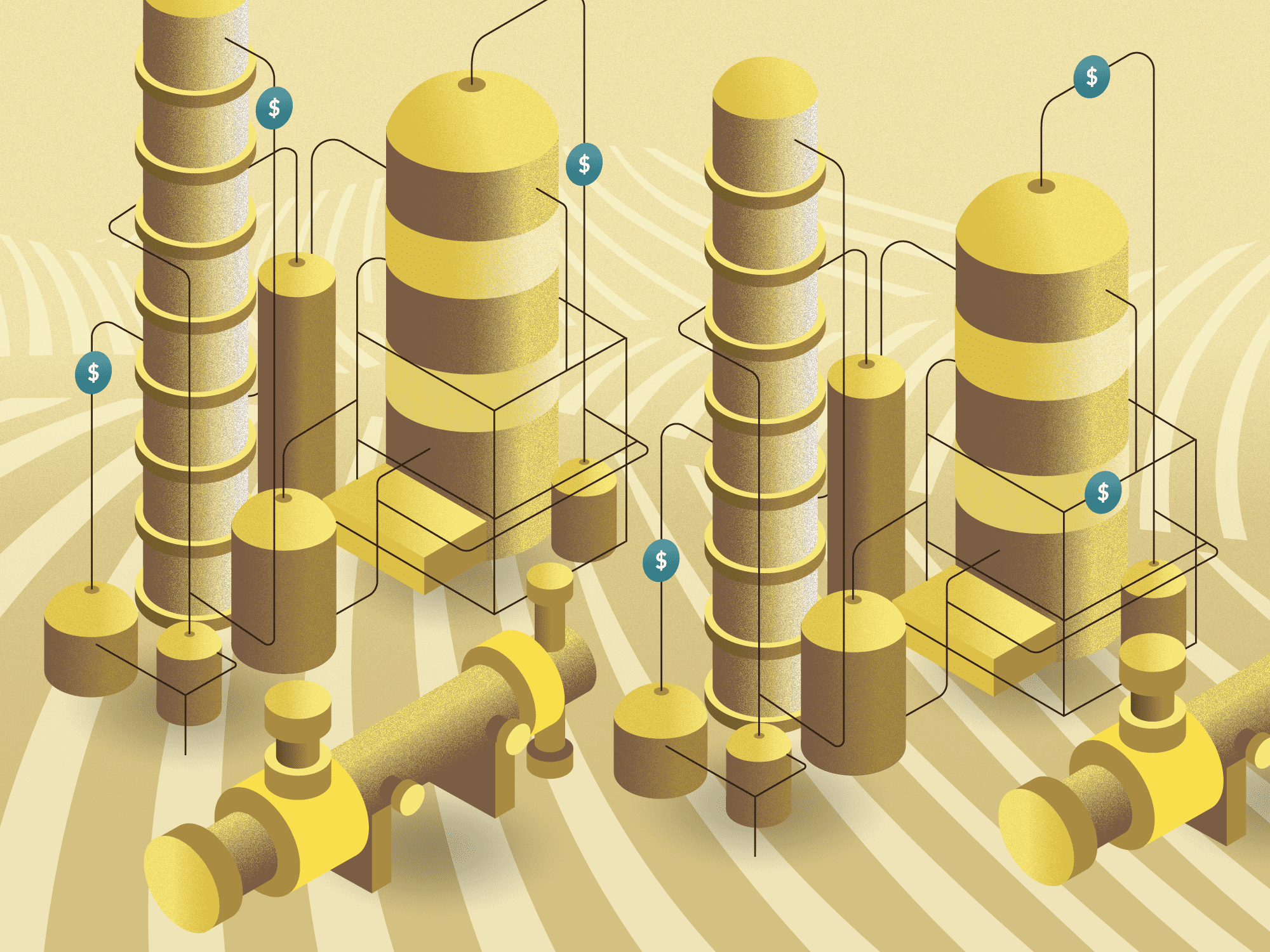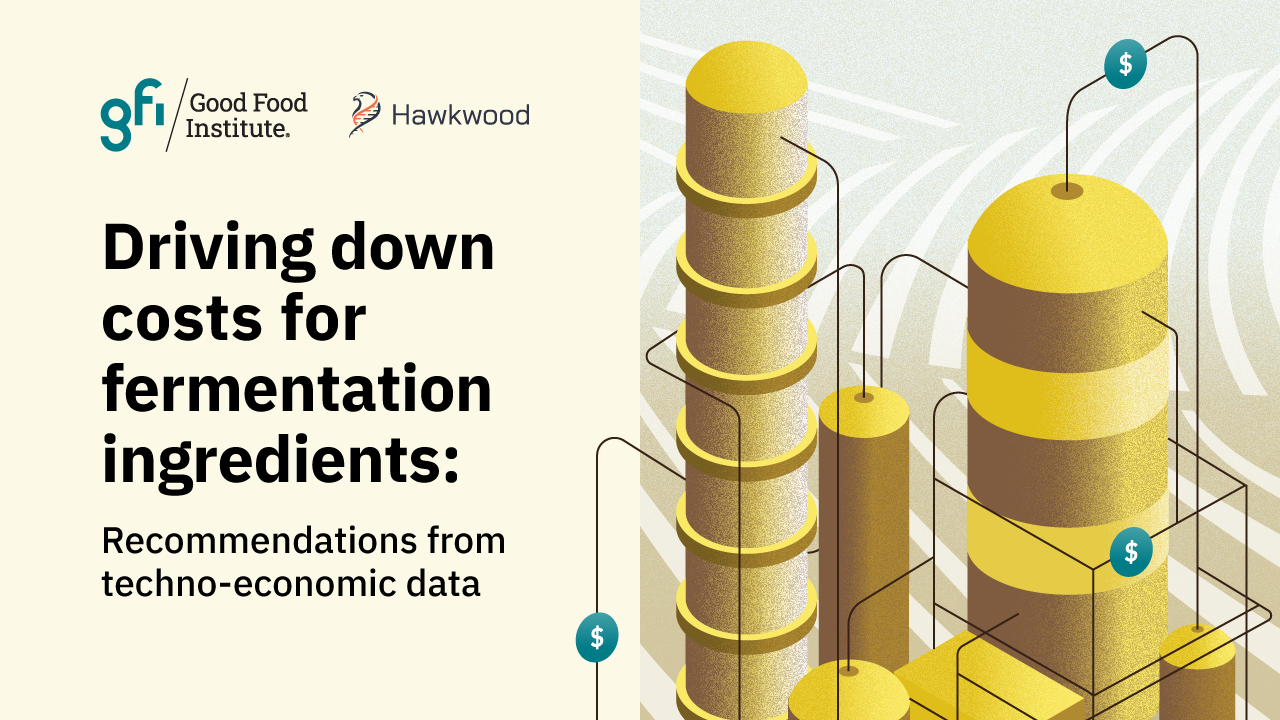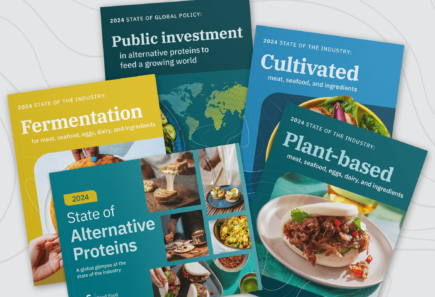
Driving down costs of fermentation-derived ingredients
This report by GFI and Hawkwood Biotech analyzes the cost and competitiveness of fermentation-derived ingredients, outlines cost drivers and reduction strategies, and highlights critical data gaps.

Download summary & full report
Exploring the economics of fermentation-derived ingredients
Fermentation-derived (FD) ingredients are gaining momentum in the alternative protein sector for their potential to rival conventional ingredients in cost and taste, while enhancing the sustainability of the global food system.
To unlock large-scale investment and accelerate innovation, policymakers, investors, industry leaders, and researchers need a clear understanding of the economic viability of FD products.
This report provides the most comprehensive analysis to date of the cost competitiveness and cost drivers of FD ingredients—including biomass protein, precision fermentation-derived protein, and microbial lipids.
This report equips stakeholders to assess performance targets, prioritize R&D, and invest in the innovations needed to achieve cost parity and scale.
Key highlights of this report
- Biomass proteins are closing the price gap with several incumbent proteins. Biomass cost of production from published models converges around $4-$6/kg, comparable to market prices of $6.0-$15.0/kg for beef and pork.
- Microbial oils are competitive with some high-value incumbents, but cannot compete on price with commodity oils. The microbial oil cost of production from published models ranges from $1.5 to $19.6/kg, with omega-3 oils at the upper end. These costs are far above commodity oil and fat prices.
- Improved feedstock costs, feedstock conversion, and capital efficiency emerge from published TEMs as key levers of cost reduction.
- When it comes to processes using refined sugars, optimizing process performance is key to reducing production costs.
- Improving capital efficiency is essential to unlocking economies of scale for low-cost, Gen2 feedstocks.
- Insights into fermentation’s potential are limited by techno-economic blind spots. Standardization and new models across a wide range of fermentation processes are needed to fill the gap.
Explore the supporting data
Download the public techno-economic model dataset and incumbent product prices supporting this analysis.
Published techno-economic model data compilation
Compilation of published techno-economic publications, models, and associated data.
Incumbent product pricing compilation
Compilation of trade and market prices for incumbent proteins and lipids.
Do you have a new fermentation techno-economic model (TEM) related to alternative proteins? Or did we miss a key publication? Submit it here!

Watch our webinar
Dive into the cost competitiveness of fermentation-derived ingredients and how to reduce production costs based on insights from this new report!
Download the report
Help us improve your experience. Share your information to help us shape future content. Or skip this step and download as a guest.
Have a question about this report?
Adam Leman, PhD
PRINCIPAL FERMENTATION Scientist
Adam is a Principal Scientist, Fermentation at GFI, and is focused on the development of biomass fermentation and precision fermentation biotechnology for food protein. He earned a B.S. in Molecular Genetics from the University of Rochester and a Ph.D. from Drexel University College of Medicine in Molecular Biology. Adam’s postdoctoral studies concentrated on fungal genetics and systems biology. During his time in biotech, Adam implemented gene expression analyses in microbial, agtech, and human health studies to better characterize these systems and offer a deeper understanding of strain development and process improvement.

Related resources
Co-authored by Hawkwood Biotech

Hawkwood is an industrial biotech consulting firm helping organizations dramatically accelerate their path to market.






